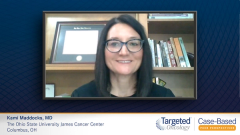
Options for Second-Line Therapy in Patients With Follicular Lymphoma
Considerations for subsequent treatment options in the second-line setting for patients with follicular lymphoma are reviewed by an expert hematologist.
Episodes in this series

Kami Maddocks, MD: When choosing a second-line therapy for patients with follicular lymphoma [FL], there‘s a number of options. Decisions should be based on what therapy did the patient receive in first-line? Did they receive R-CHOP [rituximab, cyclophosphamide, doxorubicin (hydroxydaunorubicin), vincristine (oncovin), prednisolone]? Did they receive BR [bendamustine plus rituximab]? Did the receive single agent rituximab? How did they tolerate that therapy? How long did their response to that therapy last? There‘s always an option to repeat the use of chemoimmunotherapy. So, if somebody had BR or R-CHOP in the front line, and they get a prolonged response to chemotherapy, you could consider using the other chemoimmunotherapy option at relapse.
Again, a lot of times my preference is to save R-CHOP. Therefore, if somebody is going to transform, I have that anthracycline based therapy. But again, with a good response to chemoimmunotherapy, you can use a different chemoimmunotherapy rituximab in combination with lenalidomide is an option for second line therapy, and this is probably my most used second-line treatment. I feel like this is a good option in both patients who‘ve had a good response to first-line therapy and those patients who have a little bit earlier of a relapse changing the antibodies, so obinutuzumab as I mentioned, this can be used in frontline follicular lymphoma. Although, typically this is something I use in combination with either chemotherapy or consider it in combination with lenalidomide therapy when patients relapse. I do not use maintenance therapy in the second-line setting.
Transcript edited for clarity.
Case: A 74-Year-Old Man With Relapsed/Refractory Follicular Lymphoma
Initial presentation
- A 74-year-old man complains of a 6-month history of fatigue, occasional fevers, decreased appetite, fatigue, and an 8-lb weight loss
- PMH: unremarkable
- PE: palpable right axillary and cervical lymph nodes, palpable ~ 3 cm in both locations; spleen palpable 4.5 cm below left costal margin
Clinical Workup
- Labs: ANC 1.6 x 109/L, WBC 11.2 x 109/L, 44% lymphocytes, Hb 9.6 g/dL, plt 98 x 109/L, LDH 315 U/L, B2M 3.5 µg/mL; HBV negative
- Excisional biopsy of the axillary lymph node on IHC showed CD 20+, CD 3+, CD5+, CD 10+, BCL2+; follicular lymphoma grade 2
- Bone marrow biopsy showed paratrabecular lymphoid aggregates, 4% involvement
- Molecular genetics: t(14;18) (q32;q21)
- PET/CT showed enlargement of right axillary, cervical, and mediastinal lymphadenopathy (3.3 cm, 3.1, cm and 4.6 cm respectively)
- Ann Arbor Stage IV; ECOG 0
Treatment
- He was treated with R-CHOP for 6 cycles, achieved complete response and continued rituximab maintenance
- 24 months later he complained of increasing weight loss, fever and drenching sweats as well as more enduring fatigue and new onset itching; he was currently taking antibiotics for his 3rd bacterial infection in the past year
- Repeat PET/CT revealed progression of disease
- He was started on bendamustine + rituximab for 6 cycles and continued on rituximab maintenance
- Repeat lymph node biopsy grade 2 follicular lymphoma
- 12 months later he complained of continued weight loss, increased itching and worsening fatigue; recurrent infections continued
- He was started on idelalisib 150 mg PO BID









































